Karel de Grote University of Applied Sciences and Arts – Antwerp, Belgium
The activities that the department has carried out (in the last two years) with regard to equal access/inclusion/diversity are:
support and counselling for students and university staff;
lectures, workshops, seminars for students, faculty and non-teaching staff;
The activities with the greatest impact in the context in which this programme operates was a plan named ’Training of educational staff’. It is designed as a long-term and custom-made training programme. It is designed in collaboration with some of the team members of the team that will follow the training. The factors contributing to its success include continuity (e.g., one year), team-wide training, and co-design
The last innovative practise/tool introduced at KGH when it comes to ensuring inclusion, diversity and equal access was the creation of a checklist for teaching staff to screen their materials and courses on the topic. In addition to activities to support inclusion, KGH implements measures to counter exclusionary and discriminatory practices through the creation of a reporting point for discriminatory and transgressive behavior.

Team professionalization Diversity and inclusion (Teamprofessionalisering Diversiteit en inclusive)
Antwerp, Belgium
IDEA-net: Expanding the network of Inclusion, Diversity, Equity and Access (IDEA) practitioners in higher education through institutional capacity building
Project ref: 2022-1-NL01-KA220-HED-000089789

This project has been funded with support from the European Commission. This website reflects the views only of the authors, and the Commission cannot be held responsible for any use which may be made of the information contained therein.
